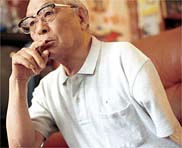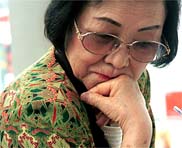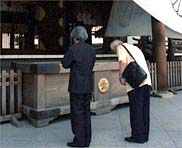
![]()
June 20, 2001
Specter of a Rearmed Japan Stirs Its Wartime Generation
By HOWARD W. FRENCH
|
"It was a pure loss," he says today, looking back not just on that battle, but on Japan's entire war. "Even as a young man, I wondered how could people who have been sent so far from home feel like they are protecting our country. Japan was attacking other countries, and if protecting ourselves was the mission, all we had to do was stay at home."
Mr. Mizuki offered his recollections against the backdrop of what may be Japan's first real passionate public debate on the long-taboo subject of the nation's 20th-century history of conquest and defeat.
This rare national conversation has been provoked by an early proposal by Prime Minister Junichiro Koizumi that would break with decades of official pacifism and revise the American-written postwar Constitution, which bars Japan from raising an army.
It is a conversation largely confined to those who were alive during the war. Younger Japanese display at best a sketchy knowledge of the Japanese imperial conquest in the 1930's, in part because the history curriculum in schools ends before that period. And the apathy about policy and politics that characterizes many Japanese born after World War II extends to the question of changing the Constitution.
While Mr. Koizumi and other politicians push for a more assertive Japan, many Japanese who lived through Japan's expansion in Asia and war retain vivid memories of the immense cost to their country and are cautioning against the vogue of revisionism. In a series of interviews, they expressed strong reservations or outright opposition to a constitutional change.
They also revealed deeply mixed feelings about Mr. Koizumi's intention to visit a Shinto shrine dedicated to the nation's war dead in August, an announcement that enraged China and Korea, which were brutally occupied during the war. Among the millions of fallen victims to Japan's modern wars, that shrine honors 14 men, like the wartime prime minister, Tojo, who were condemned as so-called Class A war criminals for their roles in World War II.
Reflecting the fact that Japan has never really held a national discussion of the war, the comments of these people, mostly in their late 70's or their 80's, were remarkably varied in their understanding of Japan's midcentury militarism.
While Mr. Mizuki viewed the war as a colossal and misguided waste, other veterans still accepted the official wartime explanations of Japan's expansion in Asia and attack on Pearl Harbor: that Japan was being strangled by Western powers and was determined to liberate its fellow Asians from colonialism.
Mr. Mizuki described the Constitution as "fine just the way it is." "For the time being we are remaining quiet," said the 79-year-old veteran, who is a well-known manga artist, or cartoonist. "We lost the war and have been putting on a kind of camouflage of modesty. But if you look at our history, you see our aggressiveness. And if we change the Constitution the natural consequence will be for us to rearm."
Toyoko Senda, a retired teacher, remembers well the little ceremonies that were held in her small hometown in Hokkaido to see off fresh recruits. Just as vividly she recalls the mournful gatherings of people to greet the returning ashes of those who died in battle. There are memories too of when her town came under American naval bombardment, and of the shock she felt as a 20-year-old hearing Emperor Hirohito's voice for the first time, like all Japanese, announcing that Japan had been defeated.
For this 75-year-old woman who does volunteer work as a research assistant at a conservative Shinto university in Tokyo, the prime minister's proposed visit to the war shrine revives an anger over official hypocrisy and deceptions that have remained unresolved for decades. "Until the end of the war we were taught that people who died for Japan would become gods and would be enshrined at Yasukuni," Ms. Senda said. "The shrine only became an issue after Tojo and the other criminals were enshrined there. "But when you think about it, telling people that the deceased will become gods is rather strange, isn't it? And what of the Koreans who were killed? Why aren't they enshrined also?"
Ms. Senda, who spoke in a sleek cafe overlooking Shibuya, one of Tokyo's trendiest neighborhoods, attacked the nationalist historians who are writing school textbooks that embellish Japan's past. One such book, a new junior high history text that seeks to exonerate the nation of guilt for its expansionism in Asia and war with the United States, has become a nationwide best seller.
"Their views are very close to the imperial history of the past," she said. "I was made to worship the emperor then, so maybe this is a personal reaction. But I would say that the roots of the war lay in our emperor system, and it bothers me that the emperor never apologized or accepted responsibility. Germany has apologized. The United States apologized to Japanese-Americans. But we are still dragging around issues like comfort women, and you wonder if it is because we've lacked good politicians, or because the Japanese character prevents us from apologizing."
Minoru Mizuno, a sprightly veteran of battles from Manchuria to the Philippines who fought for 13 years in the army tank corps and ended the war with the rank of second lieutenant, not only begged to disagree, but delivered a nearly hourlong soliloquy on the justness of Japan's combat.
Repeating with conviction the very themes that were used in the indoctrination of Japanese throughout the war, Mr. Mizuno said his country had been fighting strangulation by Western colonial powers like America, Britain and the Netherlands. Moreover, he insisted, the war had a noble purpose: the liberation of other Asians. "The West wanted to exhaust us," said Mr. Mizuno, who followed handwritten notes as he spoke in the neat and narrow study of his central Tokyo home, where he bragged that he still used an abacus. "The Western countries were colonizing Asia and subjecting people to slavery. They couldn't tolerate the idea that Japan could wage a war of liberation for Asia."
Mr. Mizuno said the Constitution had to be written so that "Japan could never again pose a threat to the United States," but insisted that times had changed and the country's Constitution should be allowed to change too. "We don't want to fight a war against anyone," he said, "but we must be able to defend ourselves too."
Asked about the inclusion of people like General Tojo, the hard-line militarist who served as prime minister during the war, among those honored at Yasukuni, Mr. Mizuno, who still uses the war's euphemistic old name, was unbothered. "Indeed they were war criminals," he said, "but the Japanese people do not believe that the Greater East Asian War was the wrong war. It's that the wrong means were used, but the criminals were executed so we should forgive them."
For a man who defended his country's actions so strenuously, Mr. Mizuno seemed briefly perplexed when asked if he would have liked for Japan to have won the war. "The military was running rampant in our country, and Tojo was a dictator," he said. "So I think it was good that Japan lost. We were able to become a democracy."
Another veteran, Ichiro Niimi, graduated from Japan's leading military academy, served as an engineer for one of Japan's most famous air wings in Southeast Asia and ended the war as a major. He broke off from a group of veteran friends visiting Yasukuni Shrine to speak with a foreign journalist, and sat in the cooling shade on a park bench, near a huge artillery piece and locomotive from the so-called Burma-Thailand Death Railway, whose construction killed many thousands of forced laborers.
"As a person who fought in the war, I think it is natural for the prime minister to go to the shrine and worship the dead," said the 80-year-old former officer. "China and other countries are complaining that war criminals are enshrined here, but those people didn't die for their own purposes. They gave themselves for the peace and happiness of Japan, just like the war dead from anywhere else, and I do not regard them badly."
At 69, Shigeyuki Hiruma was too young to fight in the war, but he still cannot forget its devastation. One month before Japan's surrender, his older brother died of starvation in New Guinea. A sister who moved to Manchuria was killed there as the Soviets attacked. Mr. Hiruma had just returned to Tokyo from an evacuation to the countryside when the city was firebombed by the Americans in March 1945. He was 13 when the war ended. "There is no one who hates war more than I do," he said.
Mr. Hiruma had come to Yasukuni Shrine on this sweltering day to stand before its giant cedar altar, summon the Shinto deities with a clap of his hands and visit with his brother's spirit. "I wanted to tell him that we've done some work on the family grave," he said.
Mr. Hiruma said he had no objection to a revision of the Constitution, as long as military service was voluntary. Japan will remain peaceful, he said, because "no country could fail to learn its lesson after such a horrible war." But he reached starkly different conclusions from Mr. Niimi's. "It was obvious to me even as a child that Japan was after resources," he said. "We had no oil, and that led us to invade other countries. Vehicles in Tokyo back then ran on charcoal. But it was a mistake for Japan to try to colonize other peoples, in China and Korea and even Manchuria."
"It is normal for public figures to visit this shrine," Mr. Hiruma said, "but I have reservations about the criminals. They didn't die in a battle. Frankly speaking, Tojo and the others cheated the people of Japan by pursuing a war we had no hope of winning."


